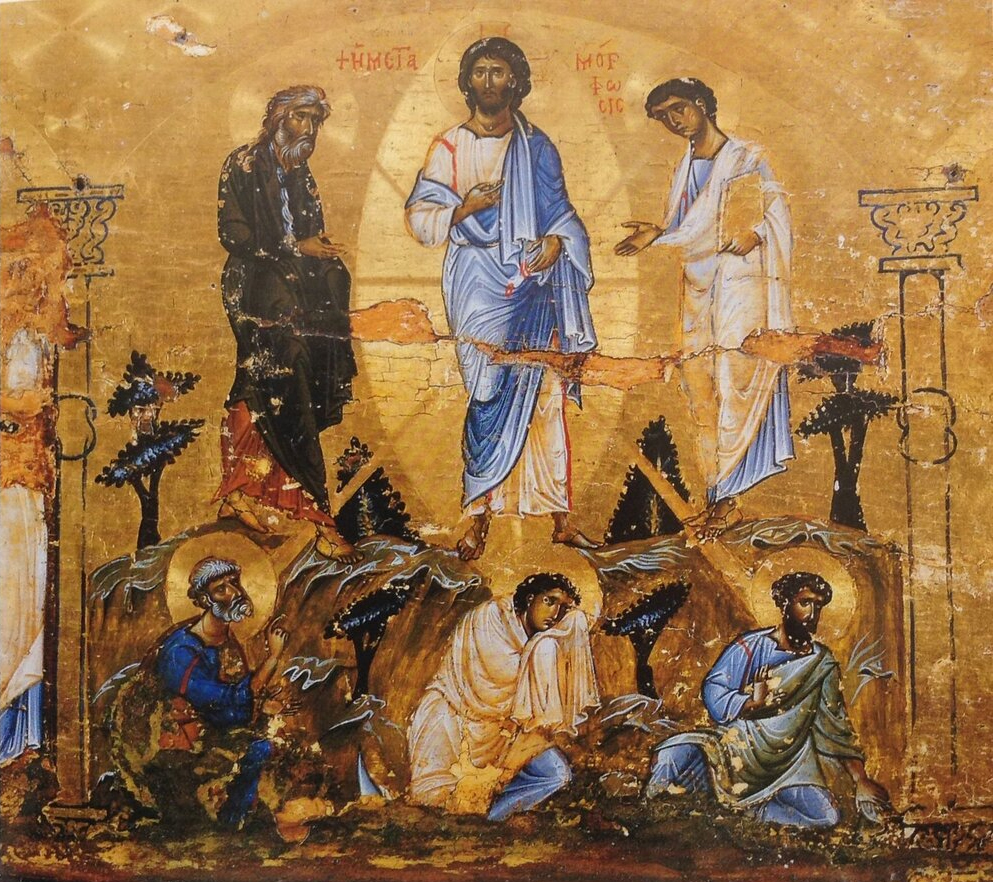John 10: 11-18
11 I am the good shepherd: the good shepherd giveth his life for the sheep.
12 But he that is an hireling, and not the shepherd, whose own the sheep are not, seeth the wolf coming, and leaveth the sheep, and fleeth: and the wolf catcheth them, and scattereth the sheep.
13 The hireling fleeth, because he is an hireling, and careth not for the sheep.
14 I am the good shepherd, and know my sheep, and am known of mine.
15 As the Father knoweth me, even so know I the Father: and I lay down my life for the sheep.
16 And other sheep I have, which are not of this fold: them also I must bring, and they shall hear my voice; and there shall be one fold, and one shepherd.
17 Therefore doth my Father love me, because I lay down my life, that I might take it again.
18 No man taketh it from me, but I lay it down of myself. I have power to lay it down, and I have power to take it again. This commandment have I received of my Father.
Christ offers himself to the people as the good shepherd, recalling a favourite theme of Old Testament prophecy. Priests and kings are so described, and indeed God is spoken of as a shepherd, as we hear, for example, in Psalm 23:
THE Lord is my shepherd; I shall not want.
2 He maketh me to lie down in green pastures: he leadeth me beside the still waters.
3 He restoreth my soul: he leadeth me in the paths of righteousness for his name’s sake.
4 Yea, though I walk through the valley of the shadow of death, I will fear no evil: for thou art with me; thy rod and thy staff they comfort me.
God’s promise is to take care of his people. His promise is that a new shepherd will come to us, descended of the house of David. We hear in Ezekiel 34:
11 ¶ For thus saith the Lord God; Behold, I, even I, will both search my sheep, and seek them out.
12 As a shepherd seeketh out his flock in the day that he is among his sheep that are scattered; so will I seek out my sheep, and will deliver them out of all places where they have been scattered in the cloudy and dark day.
13 And I will bring them out from the people, and gather them from the countries, and will bring them to their own land, and feed them upon the mountains ofIsraelby the rivers, and in all the inhabited places of the country.
14 I will feed them in a good pasture, and upon the high mountains ofIsraelshall their fold be: there shall they lie in a good fold, and in a fat pasture shall they feed upon the mountains ofIsrael.
15 I will feed my flock, and I will cause them to lie down, saith the Lord God.
16 I will seek that which was lost, and bring again that which was driven away, and will bind up that which was broken, and will strengthen that which was sick…
23 And I will set up one shepherd over them, and he shall feed them, even my servant David; he shall feed them, and he shall be their shepherd.
24 And I the Lord will be their God, and my servant David a prince among them; I the Lord have spoken it.
Today’s Bible verses continue to develop Jesus’ declaration of himself as the Good Shepherd. We have heard how false teachers have, as it were, crept into the sheepfold over the wall, rather than entering through the gate as the shepherd does. Jesus has developed the thought, going on to describe himself both as the shepherd and as the gateway to the sheepfold. It is through Jesus that we enter into the sheepfold to be saved.
Now Jesus distinguishes himself further, as the good shepherd, from false teachers who, like mercenaries, care only for their own interests and not for the sheep. Such are those who block the people’s way to Jesus, among them some teachers of the Old Law, the Jewish authorities, the scribes and the Pharisees, whose position, whose vested interests, Jesus threatens. These are deceivers of the people, blind men, blind guides, who seek to occlude our love and knowledge of Jesus.
In this parable, Jesus tells us that he will save us by laying his life down for us. He adds that he has further flocks of sheep to gather together, all the people over the whole world, who are to be joined as one flock with one shepherd. Jesus’ giving of his life flows from his infinite love for us, in complete contrast to the attitude of the hirelings who do not really care for the sheep.
Further to this, Jesus speaks of the mutual knowledge between himself and those who believe in him, and he compares this to the mutual knowledge of the Father and the Son, which itself is a truth at the heart of our salvation. Through his divinity, and through his relationship with God the Father, Christ will freely lay down his life for his sheep, for us, and then have power to have life again, and to bring us to life.
‘So the sheep find the Lord’s pastures; for anyone who follows him with an undivided heart is nourished in a pasture which is forever green. What are the pastures of these sheep if they are not the deepest joys of the everlasting fresh pastures of paradise? For the pasture of the saints is to see God face to face; when the vision of God never fails, the soul receives its fill of the food of life for ever.
‘And so, dear brethren, let us seek these pastures and there join in the joy and the celebrations of so many citizens of heaven. Let their happiness and rejoicing be an invitation to us. Let our hearts grow warm, brethren, let our faith be rekindled, let our desires for heavenly things grow warm; for to love like this is to on the way.’ Pope St Gregory the Great
Audio Bible KJV | Endnotes
The parables of Jesus anticipate Jesus’ Passion – crucifixion of Jesus. ‘I am the light of the world… I am the way, the truth and the life.’ We look forward in the parables to the Christian Cross – to Jesus on the Cross – to Easter. Jesus’ parables are an ongoing and yet in part secret revelation of Jesus Christ as God the Son. Within the parables, we anticipate Easter. There is clarity and strength and conviction in the success of Jesus’ mission. We are in a sense risen again already, howsoever a part of yet in the journey must acknowledge Jesus in the Garden of Gethsemane. The torment is not yet. We are as yet in joy to walk with Jesus. May we have the strength so sustained to encounter our Gethsemane. A prayer with Christ.








